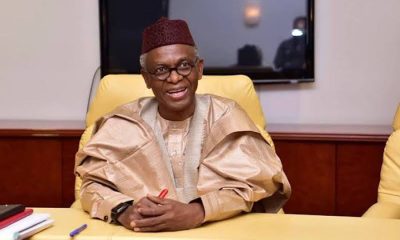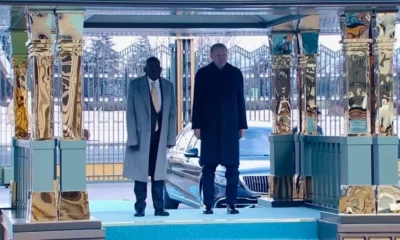Politics
2023 presidency: We’ve been and remain kingmakers — Northern Elders
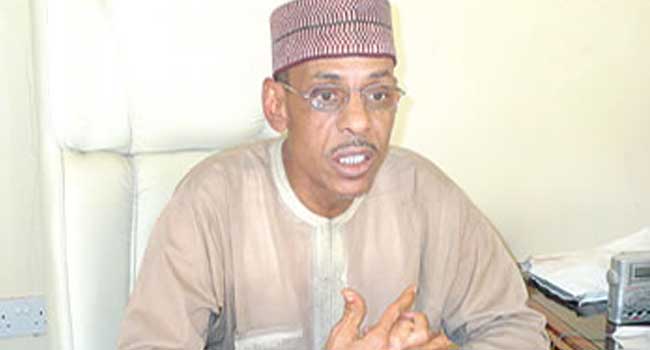
The Northern Elders Forum has said that the North will be a strong factor in determining who emerges as Nigeria’s president in 2023.
The position of the NEF was contained in a speech by its Director, Publicity and Advocacy, Dr. Hakeem Baba-Ahmed.
In the speech read on Saturday during the meeting of the Northern Leaders of Thought at the Arewa House in Kaduna, Baba-Ahmed said the North had always had a say in who becomes the leader of the country.
In the speech, titled: “Rebuilding the North,” he said: “May I start by expressing my profound appreciation for the privilege of delivering this Keynote Address on a date and a venue that have major historical significance for the North and Nigeria. This honour is all the more humbling given the significance of our present surroundings as well as the current state of the North and the country as a whole. This is also a rare event. Although groups and associations have raised voices on insecurity, poverty and the damaging decline of the economy of the North and the setbacks in relations between communities that make up Nigeria, many Northern elders and leaders with personal integrity and other qualities who should stand up to be counted have largely retreated into the discomfort of silence.
“Younger Northerners are angry, frustrated and alienated, with virtually no linkages with elders and leaders, unless they are hired thugs in the service of politicians. Many others are criminals, bandits, informers or kidnappers exploiting the weaknesses of the State, or at margins of hopelessness in a country that they believe promises a lot and delivers nothing. This meeting appears to have been designed to commence the building of bridges that should link generations of Northerners around a vision which gives hope and heals a region lacking a single excuse for its many wounds.”
READ ALSO:
- American holds hostages in synagogue for hours
- 2023: Bagudu Battles Aliero Over Malami, Senate Leader As APC Crises Get Messier
- 2023: Tinubu most popular in Northern Nigeria, will emerge APC candidate in Direct or Indirect Primaries —Jubrin
- I became armed robber after I dropped out in JSS 3 – 16-yr-old who rapes older women confesses
“The effort of the organizers of this meeting, specifically to bring together prominent, elderly and future leaders of the North is particularly commendable. In this room, and in these surroundings, there is the history of people who took over the responsibility to steer the North through the challenging waters of decolonization and finding for it a fitting place in the new Nigeria. Most of them were in their 30s and 40s, but they understood their historic opportunities; the values they were prepared and groomed to defend, and the challenges which they were to face.
“Their team leader, Sir Ahmadu Bello, fell to bullets from cowardly murderers in these very premises. The people who killed him simultaneously launched Nigeria into a different and negative trajectory from which it has not recovered. Today, we can speak as three or four generations of Northerners who have seen the best and now live in the worst of the North. We can lament the loss of great opportunities, but we will also support each other to find the strengths and the courage to ask the right questions and find the right answers.
“We should use this day, at this venue full of history, to signal a turning – point in our circumstances as a people and bring an end to lamentations. We have wasted enough lives, blood, energy and resources drifting and blaming leaders who have reaped hugely from our misfortunes and self-inflicted injuries. It is enough.
“We have no one else to cry to; no one to look up to, to lead us out of terror and poverty and no one willing to use their positions to turn the fortunes of the North around. Our fate will only be designed and determined by us. We may be facing unprecedented challenges, but these are times to prepare to find extraordinary strengths and assets so that our children will be rid of the current nightmares which are our lives today.”
“We do have massive sources of energy and muscle to bring real change to our circumstances. We have the anger of people whose lives have been taken over by armed criminals who know we are basically undefended against them. We have limits on how much we can run away from bullets, rapists and kidnappers, and we are reaching those limits.
“We have memories of a period when life had values; when religious faith meant you tolerate, and not kill those who worship differently from you; when leaders feared God and had respect for the people they led; when being a Northerner meant honesty and hard work, and not a disposable threat; when our young where taught values that prepared them to fear God, respect authority and stand up to bullies and those who were intolerant of our basic identities and values.
“Anger is not the best fuel for change, but in our case today, it is the most potent. If used constructively and responsibly, it can create an environment that will remove its sources and its manifestations. Unfortunately for the North, it is also the only fuel source we have. We have voted people into power who have either turned their backs at us or have usurped the very sources of their power and turned them into personal assets.
“We have a democratic system that progressively benefits only a handful of leaders and politicians, and leaves millions of our people to wonder how it could be the best option available to terrorized, poor people. We have decaying value systems that breed evils such as corrupt leaders, armed criminals and drug pandemics, and encourage cheating and corruption as the only means of getting what we need. We have a huge population that is sinking into poverty and desperation in a harsh and unforgiving world.
“Every indicator suggests that things will get considerably worse in the near future. The cost of living will rise and compound the wretchedness of the poor. Armed criminality will continue to determine how we live and die, even if it could be defeated at some future date. Our political process will feed widespread violence as political competition pumps up every one of our demons to escort individual political ambitions. Our current leaders will continue to recede into their own world, mumbling incomprehensible fiction while they wait out their terms.
“The North faces two distinct choices: atrophy and destruction, or recovery and growth. The first is already visible and in the process; the second is a difficult, yet achievable goal. The most vital requirement that will make the difference between the two is a critical and honest self-evaluation. The North has to understand how cultured, hardworking and intelligent people cannot produce good leaders who can build a strong economy from its huge potential.
“How did corruption assume such magnitude among our communities that even the democratic system and our home-grown social and political structures and strong social values are now securely its hostage, consigning every segment of social life to insignificance unless it is linked to plundered wealth and stolen power? Why is its massive population a liability and not an asset, coming to life only during elections when it is needed to reinforce a shrinking democratic system, and relapsing into drudgery and scrapping an existence thereafter?
“Who and what was responsible for the virtual de-industrialization of the entire Northern region, creating patches of possibly the poorest of humanity within it, and destroying an economy that had shown an impressive potential to grow into the economic powerhouse of the nation and West Africa’s breadbasket?
“How did the North lose its tenuous hold on managing its cultural and religious diversity, setting into motion raptures that leave every community worse off, and creating enemies out of even unborn neighbours? What created the Boko Haram insurgency, and what explains its resilience and the ineffectiveness of our security assets to eliminate it? What turned some Fulani herders long used to hardship and frictions into the monsters that they are today?
“How did the Fulani, famous for learning and administration and living with huge assets with the most minimal demands on resources of the State, become identified by its lowest denominator, the Fulani bandit and kidnapper?
“Who can explain the dramatic deterioration of the most intimate of relations between Hausa and Fulani, and the rising demonization of Fulani among communities with which they are barely distinguishable, or have lived for decades or centuries?
“How did the Northerner become the villain of the rest of the nation, the source of all its recent ills and liabilities, in a country he helped build and sustain with lives, limbs, blood and labour? Above all, does the North have the capacity to re-engineer its reconstruction and sustained development?
“The North does not have the luxury of finding answers to these puzzles while the nation moves on and its problems worsen. Its only choice is to target the major source of its multiple challenges and attempt to deal with it. This, in my view, lies in the quality of its leaders and those that will lead the nation. The North needs a major shift in its elite selection processes, which will allow it to put into power, competent, honest and visionary leaders at all levels.
“What this means is that the overwhelming majority of politicians warming up in our major parties to take over and continue business as usual should be roundly rejected, and others who will not have to buy or steal power because they have credibility and evidence of some integrity will be voted in by voters who will resist the temptation to sell votes for less than a meal. The imperative of affecting major changes in the quality of leadership starting from the 2023 elections is beyond question. This is why the North should support major amendments of the electoral process, and improvements in the capacities of INEC to reduce rigging and vote-buying and violence.
“For most of what the North needs to do, the centre is important. The successful campaign to defeat the damaging narrative that no Northerner should aspire to contest for the Presidency of Nigeria is a credit to committed democrats and those who believe in justice, equity and fairness. It is important to emphasise, however, that this was not a campaign that sought to bestow any favours on the North and shortchange the rest of Nigeria.
“It was essentially meant to avoid restricting the political space, as well as the danger of the emergence of a President who bears all the hallmarks of limiting identities and the stamp of a victory of the part over the whole. Now that a level playing field is being taken up by politicians from all parts of the country, it is equally important to remind ourselves that democracy is essentially about the freedom to choose leaders, and all Nigerians should be free to choose any contestant from any part of the country they want.
“For the North, we cannot say it louder. A Northerner should be voted President only if he is the best. Being Northerner is not enough. All Nigerians need good leaders, but for us in the North, we will demand to see evidence that a candidate does not just want the power to fulfil a personal ambition. We want to see evidence that those who want to lead us in future understand the roots of and solutions to our insecurity and poverty and distances from each other.
“We want to know how irredentism will be handled; how and when major changes in our structures and systems will be made to address popular grievances over the way our country should operate; how our economy can be re-engineered to achieve sustainable development and work for the rich and the poor equally, and how our young will be groomed to become productive, honest and patriotic citizens. We will demand to see an inclusive and competent team that will campaign with the candidate and transit with him into governance. We want a thoroughly Nigerian President who will be as hard on the bandit as he will be on secessionists and insurgents. We want a President with vision and the energy to retrieve a country on the verge of collapse and place it securely on the path of stability, security and growth.
“We are, of course, some distance from next year’s elections, but it will be dangerous to ignore signs that the journey from this point until those elections could place the country in greater danger. We should warn politicians to avoid destroying a country they seek to lead. We must demand that the fight against organized, violent crimes is intensified. We need to improve elite cohesion even in the context of intensely-divisive electoral campaigns. Our leaders should avoid the temptations to roll out policies that will raise levels of desperation among the poor. Activities such as the planned population census which have enough sensitivity and potential to generate massive controversy a few months before the elections should be postponed.
“Key reforms to the constitution and the electoral process should be implemented to improve the quality of elections and signal a commitment to address limitations to our federal structures. Our leaders should raise their levels of empathy for the plight of poor and desperate citizens. To ignore the circumstances which create hundreds or even millions of internally-displaced persons and leave the next administration to handle it will be the height of irresponsibility. Huge resources must be deployed to improve the capacity of our defence and security assets and provide relief to fellow Nigerians or pauperized by criminals.
“Millions of Northerners are justifiably angry and frustrated that they are worse off today than they were before 2015 when they voted for an administration that promised to improve and secure lives. Many think voting for another set of leaders will add no value to their lives. We say turn your anger into an asset by voting in better people into office this time. There are politicians that will continue where the present administration stopped, and, while angry citizens refuse to vote, they will buy votes and get power. So, the most important thing a Northerner will do for himself and the community is to register and vote in 2023. Do not exchange your votes for another four or eight years in a country where your dignity and your life have little value.
“Distinguished participants, please look around these premises, and you will draw inspiration from strong, purposeful leadership, not just of the Sardauna, but the team he was a part of. From Sir Abubakar Tafawa Balewa, Sir Kashim Ibrahim, Aliyu Makaman Nupe, Turaki Ali, Sunday Awoniyi, Ali Akilu and dozens of Northerners who reflected the true diversity of the North and shared a common vision and purpose, there was a North which knew its place in Nigeria and gave all it took to defend it.
“That North is still available to be recreated, but it needs to recognise the place of good leaders, hardworking and honest citizenry, a diversity that demands the highest standards of justice to manage, and a strong sense of destiny as a strong community for all who are part of it. In this hallowed hall, there is powerful history and a great potential to re-invent a region that will be great again. Please make that potential reality, and God in His infinite mercy will help us all.”
Eagle
Politics
Osun PDP Lawmakers Endorse Tinubu for 2027, Back Adeleke Re-Election
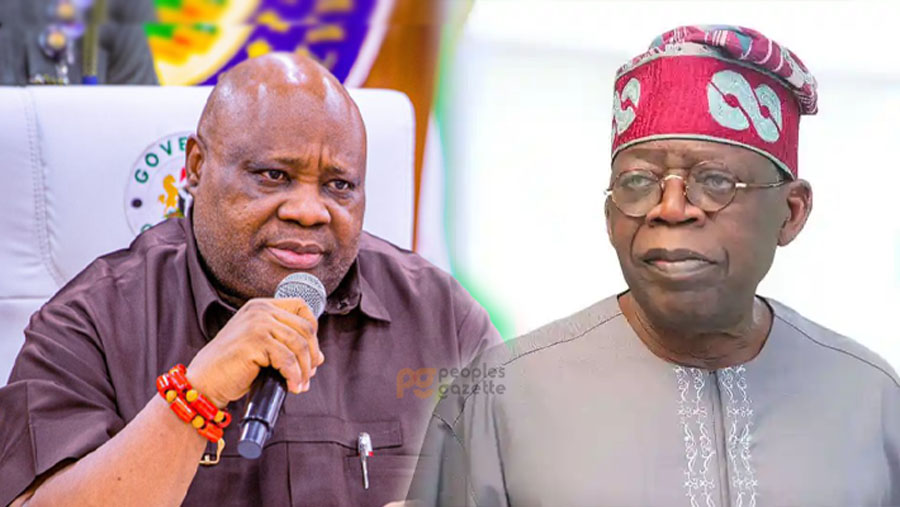
Osun PDP Lawmakers Endorse Tinubu for 2027, Back Adeleke Re-Election
Lawmakers of the Osun State House of Assembly elected on the platform of the Peoples Democratic Party (PDP) have endorsed President Bola Ahmed Tinubu for the 2027 presidential election, while also declaring their support for Governor Ademola Adeleke’s re-election bid in 2026.
The endorsement was announced at a joint meeting of the PDP lawmakers in Osogbo, where they said the decision was driven by what they described as the need for political stability, continuity in governance, and sustained development at both the state and federal levels.
Speaking on behalf of the lawmakers, the Speaker of the Osun State House of Assembly, Adewale Egbedun, said the endorsement of President Tinubu was based on his administration’s policies and interventions, which, according to them, have had a positive impact on Osun State and the South-West region.
READ ALSO:
- MACBAN Rejects Terrorism Allegations, Warns Against Stigmatisation
- Customs Seize Cocaine Worth N1bn Along Nigeria–Benin Corridor
- Security Row: El-Rufai Accuses Ribadu of Procuring Dangerous Chemicals
Egbedun noted that backing President Tinubu for a second term would strengthen federal-state collaboration, especially in the areas of infrastructure development, security, and economic reforms, while also ensuring continued federal presence in Osun.
The lawmakers also unanimously passed a vote of confidence in Governor Adeleke, citing what they described as his people-oriented leadership style, commitment to workers’ welfare, and ongoing projects across key sectors, including education, healthcare, road infrastructure, and local government development.
According to the PDP legislators, Governor Adeleke’s administration has prioritised inclusive governance, fiscal discipline, and the restoration of public confidence in government, adding that these achievements make him deserving of a second term in office.
They dismissed suggestions that endorsing President Tinubu, who belongs to a different political party, contradicts their loyalty to the PDP, arguing that the move reflects political pragmatism and the overriding interest of Osun State.
The lawmakers stressed that their decision does not weaken the PDP in Osun but rather positions the state to benefit from harmonious political alignment between the state and the federal government.
Reaffirming their commitment to the PDP, the legislators said they would continue to work for the party’s success in future elections while supporting leadership choices they believe would advance peace, stability, and development in Osun State and Nigeria at large.
Osun PDP Lawmakers Endorse Tinubu for 2027, Back Adeleke Re-Election
Politics
Ex-APC Chairman Ganduje Discusses Kano Politics, National Leadership Plans
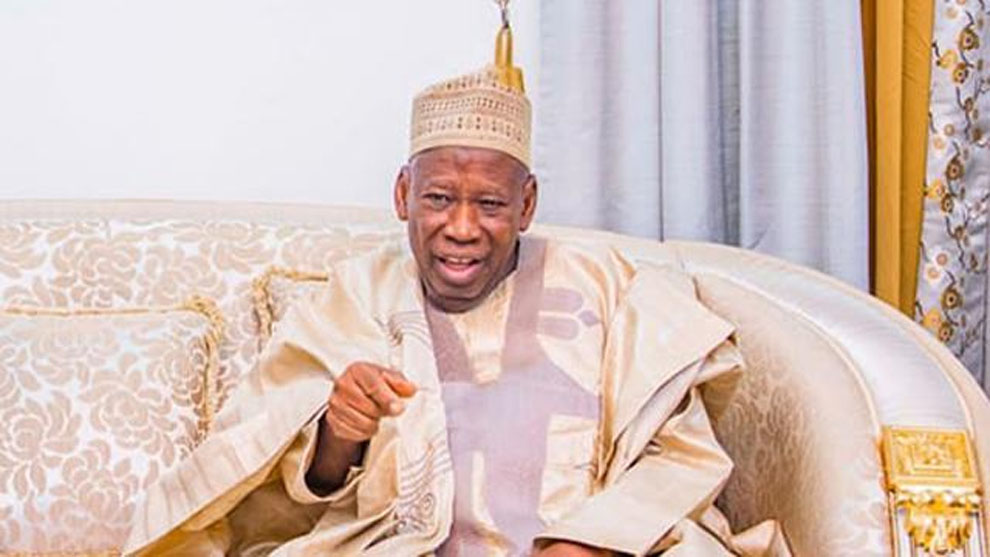
Ex-APC Chairman Ganduje Discusses Kano Politics, National Leadership Plans
Former All Progressives Congress (APC) National Chairman and ex-Kano State Governor, Abdullahi Umar Ganduje, has opened up about life after leaving office, his ongoing projects, and the future of Kano State politics in an exclusive interview.
Ganduje described life after office as less stressful but still busy, noting that he remains actively involved in party politics both in Kano and Abuja. He explained that while the pressures of leadership are gone, politics and governance never truly end. “You can’t just stop, since politics and governance never really end,” he said.
The former governor revealed that he is spending much of his time writing books to keep his mind sharp and contribute to knowledge-based politics. Among his current projects are “Abuja: Evolutionary Development of a City in Nigeria’s Capital Territory,” “Progressive Leadership and Sustainability of Democracy in Nigeria,” and “Progressive Party Ideology and Philosophical Direction.” Ganduje stressed the importance of education, research, and ideology in sustaining democracy and shaping effective governance.
READ ALSO:
- DPO Killed in Katsina Gun Duel With Bandits
- Kannywood Actress Samha Inuwa Jailed for Defacing ₦1,000 Note in Kano
- INEC May Adjust 2027 Election Dates Over Ramadan Concerns
Reflecting on his early life, Ganduje highlighted how knowledge, experience, and patience shaped his political journey. From attending primary school in a remote village to earning a PhD from the University of Ibadan, he emphasized that education and persistence were crucial in achieving his goals. His career spanned roles as local government secretary, commissioner, deputy governor, governor, and APC national chairman, providing him with extensive governance experience from the grassroots to the national level.
On Kano politics, Ganduje expressed pride that his predictions of a progressive return to APC in the state have been realized. He highlighted APC’s success in delivering the highest number of delegates and votes for President Bola Ahmed Tinubu during primaries and defeating the PDP in the general election by over 500,000 votes.
Addressing the Kwankwasiyya Movement and former governor Rabiu Musa Kwankwaso, Ganduje dismissed claims that the movement could challenge APC dominance in Kano. “The Kwankwasiyya Movement will not have any impact. Even though you see large crowds, the APC can mobilize bigger numbers if we choose,” he said, stressing that public sentiment favors APC due to concerns over the use of state resources for national ambitions by opposition leaders.
Ganduje also left the door open for political reconciliation with Kwankwaso, provided they share a common vision for the state and country. “I am ready. Politics is about interests. There are no permanent enemies or friends… What matters is what we want to achieve,” he said.
On the national stage, Ganduje addressed fears that northern Nigeria may not support President Tinubu in 2027, dismissing the notion as wrong. He emphasized that most Northerners accept the rotation of the presidency and are supportive of Tinubu completing his term. “Politics will always have noise, but the reality on the ground is different,” he added.
Ganduje’s reflections highlight the intersection of political strategy, education, and leadership experience in shaping both personal legacy and the future trajectory of Kano State and Nigerian politics.
Ex-APC Chairman Ganduje Discusses Kano Politics, National Leadership Plans
Politics
El-Rufai Says Son Bello Remains Loyal to APC Despite Criticism of Party

El-Rufai Says Son Bello Remains Loyal to APC Despite Criticism of Party
Former Kaduna State Governor, Nasir El-Rufai, has clarified that his son, Mohammed Bello El-Rufai, remains a member of the All Progressives Congress (APC) by personal conviction, even as he continues to critique the ruling party. Bello currently represents Kaduna North Federal Constituency in the House of Representatives, where he serves his constituents independently of his father’s political stance.
El-Rufai made the disclosure during an interview with the BBC Hausa Service on Thursday evening, shortly after reportedly resisting an attempted detainment by operatives of the Department of State Services (DSS) at Nnamdi Azikiwe International Airport upon his return from Egypt. The former governor, now a leading figure in the African Democratic Congress (ADC), emphasised that Bello is mature enough to chart his own political path.
READ ALSO:
- End of Weekly Shutdown: Igboho Advocates Negotiation to Resolve Kanu’s Legal Battle
- NELFUND Refutes UniAbuja Loan Diversion Claims
- NRC, Entertainers Finalise Plans for 2026 Valentine Train Ride
“My son Bello was elected under the platform of the APC and his electorate seem to be happy with the work he is doing, so since he is an adult of over 30 years, he can make his own choices. Politics is about personal preference,” El-Rufai said, explaining that his son’s continued stay in APC does not contradict his own opposition to the party.
He added that if Bello chooses to remain within the APC without engaging in any of the party’s perceived wrongdoing, guided by the values and home training he received, “then Alhamdulillah.”
Mohammed Bello El-Rufai, born in 1988, has represented Kaduna North since 2023 and currently chairs the House Committee on Banking Regulations. His work in the National Assembly has earned commendations from constituents, reinforcing his independent political credibility within the APC framework.
El-Rufai’s clarification comes amid ongoing political realignments in Nigeria, where personal choices sometimes diverge from family or party affiliations. The statement highlights the balance between individual political conviction and broader party loyalty, particularly in high-profile political families.
El-Rufai Says Son Bello Remains Loyal to APC Despite Criticism of Party
-

 Education2 days ago
Education2 days agoCheck Your Name: UNILORIN Releases Updated NELFUND Refund List for 2024/2025 Students
-

 News2 days ago
News2 days agoOsogbo Sons and Daughters Mark 5th Anniversary with Awards, Political Undertones
-

 metro1 day ago
metro1 day agoUS Freezes Assets of Eight Nigerians Over Boko Haram, ISIL, Cybercrime Links
-

 News2 days ago
News2 days agoAfenifere Calls for Immediate Take-Off of State Police as Terror Threats Rise in Yorubaland
-

 metro1 day ago
metro1 day agoTerror in Lagos Traffic: Cutlass Gang Unleashes Mayhem on Mile 12–Ketu Road
-
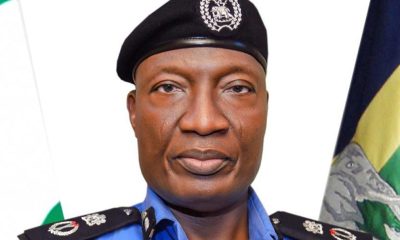
 Entertainment1 day ago
Entertainment1 day agoMystery in Lekki: Police Probe Death of Two Nollywood Crew Found Lifeless in Parked Car
-

 metro2 days ago
metro2 days agoUS Military Boosts Support for Nigeria’s Fight Against Insurgency With Ammunition, Troop
-

 metro2 days ago
metro2 days agoArgungu Festival 2026 Highlights Peace, Stability, Economic Growth — Tinubu



